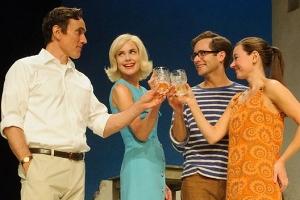Sunset at the Villa Thalia review of Alexi Kaye Campbell's new play at the National
The play ultimately fails to ignite...it's unsubtle and heavy-handed.
There's something quite disappointing about Alexi Kaye Campbell's new play which attempts to juggle a strong political message in a personal and allegorical fashion that ultimately makes it feel like a missed opportunity. Having done the same thing so magnificently in his 2008 play 'The Pride' which similarly relied on split times to reflect on a current situation, in his exploration of the state of Greece and the personal morality the strokes are too bold and the characters too broad to act as either history lesson or a sharp political punch.
The situation is set up like an Ayckbourn farce. A younger, liberal couple holidaying on a Greek Island meet an older American couple at dinner and invite them to their villa for drinks. The hints of bed-swapping and mutual attractions however go nowhere, and there are no doors to be slammed either metaphorically or literally. As the Americans suggest the younger couple (oh so liberal - they work in theatre!) buy their holiday villa off the emigrating Greek owners at a knock down rate with little thought on the wider implications, this holiday friendship attempts to act as explanation of Greek history and economy on a digestible and heavily sanitised scale. The second act in 1976 following the fall of the juntas reunites the foursome once again, and their idyllic lifestyle is called into question when they realise the extent of their ruthless actions.
Playing on one set hinders the action as characters constantly have to find reason to leave the spae to allow the plot to develop and different combinations of characters to be alone with each other. It's clunky and over done, much like soap opera writing where the children are told to "go upstairs and brush your teeth" to get out the way of a bubbling domestic. The conversation and pairings don't ever feel natural, and the overriding sexual tension pulls the tone in a conflicting direction.
Presented in thrust, Simon Godwin's production heaves under the staging that constantly aims to keep the actors moving as not to impend sight lines, rather than out of any sense of naturalism or reality. Some awkwardly blocked sections dampen the drama, and nothing is gained by having the audience tightly surround Hildegard Bechtler's handsome design.
For a play that questions core moral values each character lands too firmly on the spectrum and is far too black or white. From Elizabeth McGovern's ditzy blonde who spends the evening tanked up with alcohol only coming loose to talk about her lack of a sex life, to the bullish and over American Ben Miles as Harvey, who may as well be wearing an Uncle Sam hat, each character feels stock and functionary - there are little to no surprises. When morality is questioned it's left to Pippa Nixon's Charlotte to whine and stall, coming across as the ultimate kill joy rather than a sensible arbiter that that the play is screaming out for.
The play ultimately fails to ignite, and despite some fine performances it's unsubtle and heavy-handed. Perhaps an intervention by Thalia, the muse of comedy herself would enlighten this plodding political metaphor.
What the popular press had to say...
"Lukewarm, messy moussaka of a play."
Dominic Cavendish for The Telegraph
"Overstuffed and Underheated."
Susannah Clapp for The Guardian
"Despite Simon Godwin's canny production, actors of the calibre of Ben Miles and Elizabeth McGovern as the Americans and Sam Crane and Pippa Nixon, as the English couple, can do little to avoid becoming mouthpieces, and occasionally strident ones at that."
Ian Shuttleworth for FT
External links to full reviews from popular press
Telegraph - Guardian
Originally published on
